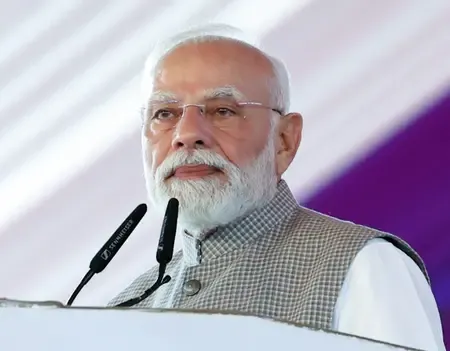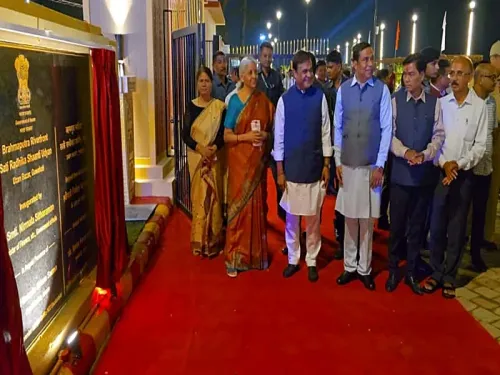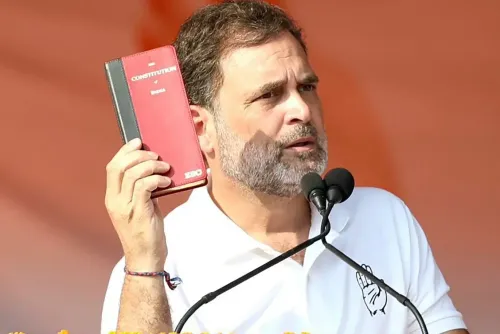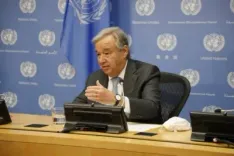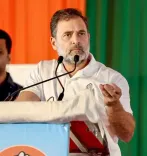Can DU Rank Among the World's Top 100 Universities in a Decade with Rs 2,000 Crores in Development? Yogesh Singh's Vision (IANS Interview)
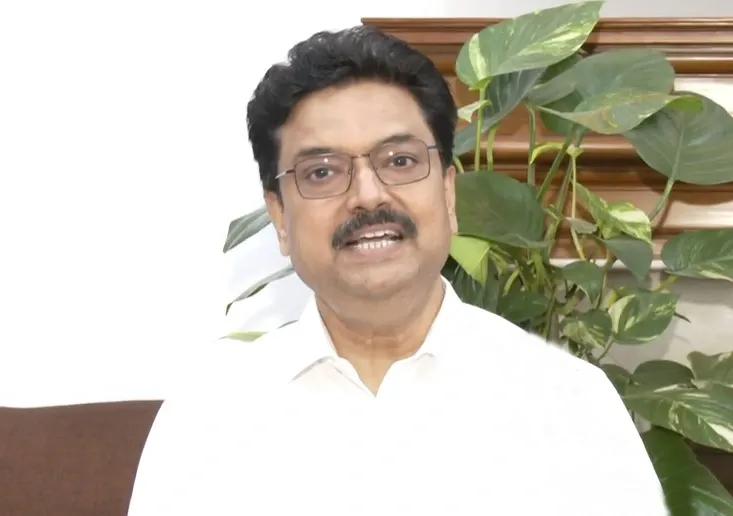
Synopsis
Key Takeaways
- Introduction of a fourth year in undergraduate studies to foster innovation.
- Ongoing infrastructure projects worth Rs 2,000 crores for modernization.
- Aim to rank DU among the top 100 universities globally in the next decade.
- Focus on incorporating national pride into the curriculum.
- Commitment to transparent recruitment processes.
New Delhi, June 3 (NationPress) The Vice-Chancellor of Delhi University, Yogesh Singh, announced on Tuesday that the university is set to implement a fourth year in its undergraduate programmes. He detailed the ongoing infrastructural enhancements, revealing that projects amounting to approximately Rs 2,000 crores are in progress. Singh expressed his ambition to elevate the institution to the ranks of the top 100 universities globally within the next decade.
Yogesh Singh took office as the Vice-Chancellor of Delhi University on September 22, 2021, becoming the 23rd VC, succeeding Yogesh Tyagi.
In a detailed interview with IANS, Singh addressed various topics, including the recent visit of the Leader of the Opposition, Rahul Gandhi, to the DU campus, the introduction of new academic courses, and his vision for the university's infrastructure.
IANS: How is DU preparing for the introduction of a fourth year in undergraduate studies?
Yogesh Singh: This is the first time a fourth year is being added to undergraduate programmes at DU, following recommendations from the National Education Policy (NEP). We have been preparing for this for the last three years. This is not an abrupt change. We are offering various options for students to choose tracks that align with their interests—whether they want to engage in research or specialize in a particular area. The emphasis is on nurturing innovation and creativity, which are essential elements of the NEP. Naturally, the introduction of the fourth year will necessitate enhanced infrastructural support, and we have instructed colleges to get ready for this. I anticipate that there will not be major issues, and any challenges that do arise will be addressed. Our colleges are among the most esteemed in the nation, with many consistently ranking in the top 20. Numerous faculty members are leading researchers with established laboratories who will be pivotal in this initiative. Currently, we are monitoring the admissions process. When introducing something new, there can be uncertainties, but with meticulous planning, we will ensure a seamless implementation. Should any student encounter difficulties, we will provide collective support.
IANS: What is the current state of DU’s infrastructure, and what future plans do you have?
Yogesh Singh: Significant infrastructure work is underway at Delhi University. I extend my gratitude to the Government of India and Prime Minister Narendra Modi. It’s encouraging to note that projects worth nearly Rs 2,000 crores are currently being executed to enhance the university's infrastructure. As we mark over 100 years since DU's establishment, much of our infrastructure has become outdated. To meet the needs of the 21st century, modern facilities are essential, and the government is fully supporting us in this endeavor. We are advancing the development of both the West and East Campuses. Additionally, we are establishing two new colleges—Veer Savarkar in Najafgarh and another in Fatehpur Beri—which will be operational soon. I am confident that within the next one or two years, DU's infrastructure will experience a major transformation.
IANS: When is Veer Savarkar College expected to be operational?
Yogesh Singh: The construction of Veer Savarkar College is already underway. I am optimistic that it will be fully functional by next year. In fact, it may be completed in the next two or three months, but we are aiming for its official opening next year.
IANS: Rahul Gandhi visited DU without prior notice. Was any action taken regarding this?
Yogesh Singh: It’s not about taking action; rather, visiting without notifying the administration is not ideal. As the Leader of the Opposition and a senior national figure, it would be preferable for such visits to be coordinated with the university administration so that appropriate arrangements can be made. He has previously visited without notice, and I believe such practices should be avoided in the future.
IANS: If this happens again with any leader, will action be taken?
Yogesh Singh: I want to emphasize that there is a proper procedure for visiting university premises. Leaders and dignitaries should inform and obtain permission before visiting. Adhering to protocol is crucial to prevent miscommunication and confusion. Otherwise, it sends the wrong message.
IANS: The principal of Laxmibai College applied cow dung in a classroom, claiming it would help reduce heat. DUSU President Ronak Khatri then applied cow dung in the principal’s office. Was this behavior appropriate?
Yogesh Singh: The application of cow dung by the DUSU President in the principal’s office is not appropriate conduct. There exist civilized and constructive methods of protest. We are in 21st-century India, focused on progress and development. Protests reminiscent of colonial times are no longer relevant. The Principal may have thought that applying cow dung would help cool the classroom—this was her personal experiment. It should have been conducted in her own space before involving student areas. Similarly, Ronak Khatri should have refrained from retaliating in such a manner. This act was inappropriate and should not be repeated.
IANS: Will any disciplinary action be taken?
Yogesh Singh: While I am not insisting on action, such incidents should be avoided in the future. As DUSU President, he should concentrate on constructive leadership. When you do good work, you naturally earn blessings and support.
IANS: Operation Sindoor showcased the Indian Army’s valor. Will it be incorporated into DU’s curriculum?
Yogesh Singh: It’s premature to make a definitive statement, but Operation Sindoor embodies national pride, love for the country, the bravery of our armed forces, and the wisdom of our leadership. It highlights how our government and PM Modi respond during crises. Such themes deserve to be included in the curriculum. Universities should focus not only on academics but also on cultivating patriotic citizens. Operation Sindoor instilled pride in every Indian. National security and patriotism should be central themes in higher education.
IANS: What initiatives are being taken to bridge Operation Sindoor and the valor of the armed forces with students?
Yogesh Singh: Our colleges are actively organizing debates, discussions, and awareness programs centered around Operation Sindoor. These initiatives help students understand the planning and execution of military operations and the bravery involved. The soldiers are often our own students—graduates of our universities—defending our safety. Every segment of society plays a role: the government, armed forces, and educational institutions. I would also like to commend and congratulate the Prime Minister for his leadership during this operation.
IANS: DU created a social media handle related to Operation Sindoor. What was its purpose?
Yogesh Singh: Following Operation Sindoor, there was a wave of patriotic sentiment across the nation. We felt that the university should contribute meaningfully. Hence, we launched a social media handle named “Ye Desh Hai Mera.” Its goal is to provide accurate information and perspectives for the youth, exploring the intellectual, psychological, and research dimensions of such national events. In an era where narratives can be manipulated, clarity is crucial. We initiated this handle on platform X to engage students in constructive national dialogue. Prime Minister Modi has pledged toward “Viksit Bharat@2047,” and it is the responsibility of the current generation to safeguard the country. As India progresses, so do the challenges. Therefore, national love must be at the core of every citizen’s values.
IANS: Delhi's Chief Minister Rekha Gupta is a DU alumna. What significance does this hold for the university?
Yogesh Singh: Delhi University has a century of history and has significantly impacted the lives of countless students. We take pride that our current Chief Minister is an alumna of DU. It’s a moment of great honor, and we also take pride in the fact that the Prime Minister studied here as well.
IANS: Have any new academic programmes been introduced to better prepare students for the future?
Yogesh Singh: DU is launching programmes that align with the current needs of the country. For example, we are planning to introduce a Bachelor of Science (BSc) in Electronic Science. Fields such as Artificial Intelligence, Data Science, and the Internet of Things (IoT) are crucial today, and our curriculum is evolving in response. We have also encouraged the Hindi and English departments to initiate MA programmes in Journalism. The English department will launch its programme this year, followed by the Hindi department next year. Accurate and responsible information dissemination is vital in a democracy, and these courses will contribute to that goal.
IANS: Where do you see DU in the next ten years?
Yogesh Singh: Various global metrics are used to evaluate academic performance. One of the most significant is the QS World University Rankings. A few years ago, DU’s rank was approximately 500. Today, it stands at 328 globally, with several departments ranking within the top 100. Our objective is to position DU among the top 100 universities worldwide within the next decade. We aim to provide world-class education to our students and consistently elevate our academic standards.
IANS: There are frequent claims that DU is influenced by a specific ideology, particularly the RSS. What’s your perspective on this?
Yogesh Singh: Frankly, I don’t comprehend the accusation. Our mission is to cultivate students who love and care for the country. Every university should aspire to develop responsible and patriotic citizens. During periods of national crisis, every citizen has a role to play. Promoting love for the country should not be politicized. If that is perceived as a specific ideology, I have nothing more to add. However, we are committed to national development and responsible education.
IANS: Is it true that individuals of a particular ideology are being recruited at DU?
Yogesh Singh: I completely disagree with that assertion. We adhere to a transparent and multi-stage recruitment process that includes screening, interviews, and evaluations of communication, writing, and soft skills. Experts from across the country are involved in the process. Those making such claims either lack an understanding of the system or do not have the facts.
IANS: Do you think there are efforts to turn DU into JNU?
Yogesh Singh: JNU is a distinct university with its own identity and culture. We are DU, and we have our own unique character. There is no basis for comparison, nor is there any intention to become like JNU.


